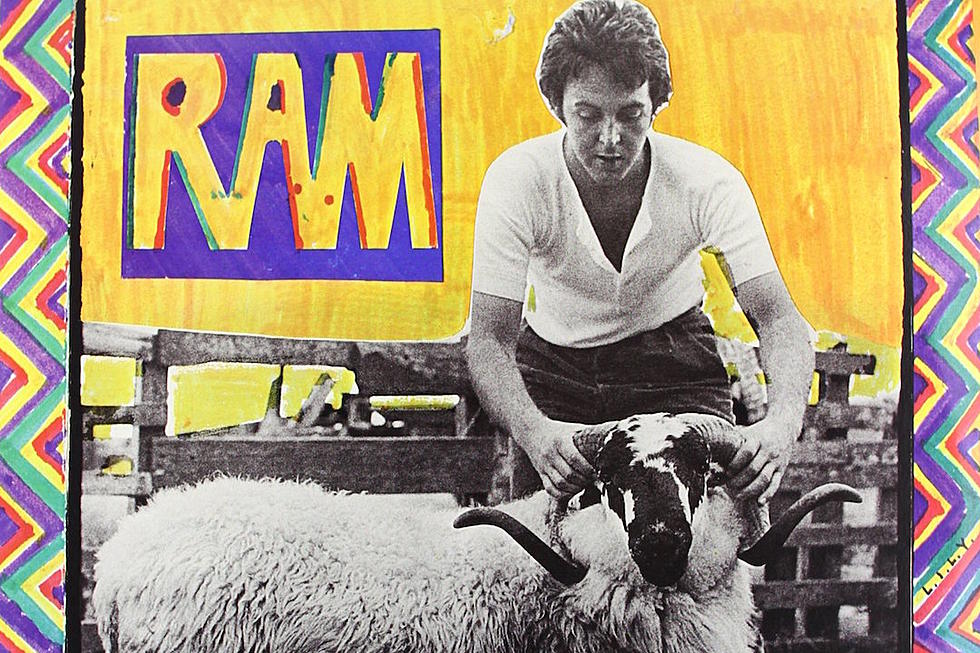
How Paul McCartney’s ‘Ram’ Became a Moment of Handmade Genius
An overlooked precursor to the current handmade-pop phenomenon, Paul McCartney's Ram was initially criticized for everything that makes it sound unexpectedly bold, fascinatingly unedited and utterly misjudged today.
The album, released on May 17, 1971, moves with a guileless joy from the country-blues parody of "3 Legs" to the plucky reverie of "Ram On," from the burping rockabilly riffs of "Smile Away" to the comfy domesticity of "Heart of the Country." Imperfect but so very interesting, Ram is just as apt to indulge in the convoluted escapism of "Long Haired Lady," as it is in the jokey doom's-day howl of "Monkberry Moon Delight," as it is in the Buddy Holly-inspired sexual innuendo of "Eat at Home."
That said, for all of McCartney's furious creativity, the loss of longtime writing partner John Lennon — not to mention Beatles producer George Martin — can be keenly felt at times.
"Uncle Albert/Admiral Halsey," for instance, always seemed to miniaturize everything McCartney once strove for with Abbey Road, feeling more calculatedly twee than truly inspired, despite its episodic construction. Ultimately, no matter how many copies it sold as a single, this is Ram's most obvious indulgence. The principal weakness that Paul McCartney has always had, the one that the Beatles at their best seemed to so deftly obscure, is fully exposed: He's so well aware of his own charm.
Worse still: How Ram is hampered, even now, by the long-forgotten sniping then engulfing McCartney and Lennon — from the haughty sermonizing of the opening track "Too Many People" to the rather silly conceit that his photographer wife was somehow stepping in for John Lennon as collaborator, from the unselfconscious contempt of "Dear Boy" (which Lennon felt was about him) to the utterly unsubtle cover image of two beetles copulating.
At the time, for some reason, both of these former bandmates were making a habit of fighting their battles through the medium of music, and the albums were poorer for it. (As delicious as Lennon's "How Do You Sleep?" might have seemed at the time, for instance, it really didn't jibe with the utopian sentiment of the title track from the same album, you know?)
Listen to Paul McCartney's 'Uncle Albert / Admiral Halsey'
Paul McCartney and John Lennon did their art, and their fans, a deep disservice by occasionally turning their songs into lines of fluttering dirty laundry, as if they didn't understand that the records might actually transcend their era. But McCartney's Ram, like Imagine, survives even these missteps by sheer force of musical will.
McCartney is, at this point, still bursting with post-Beatles ideas — and it gives this album a dizzying momentum. Even his stand-alone non-album efforts from the period, collected on subsequent reissues, end up as interesting asides. "Another Day" is like a lesser "Penny Lane." "Oh Woman, Oh Why" has always been blessedly, truly weird, with McCartney staring down the barrel of a pissed-off lady's gun.
The most intriguing moment might just be "The Back Seat of My Car," his soaringly constructed, yet desperately sad closing track on Ram.
In keeping with the rest of this project, the song is a little unfocused — too overstuffed with ideas, too reliant on multi-tracked McCartneys, not as rustic as his solo debut but somehow tossed-off sounding anyway – and simply too long. But yet it still perfectly encapsulates everything that makes Ram such a wildly inventive gem: It's gutsy and unprecious at one point and then a testament to McCartney's enduring pop sensibilities at others. As McCartney bolts from '50s-era rock to cocktail-lounge crooning to swooning violins, and back again — all inside of this one final tune, mind you — there is a sense of limitless possibility.
Neatly foreshadowing the quirky allure of today's homespun singer-songwriter projects, Ram certainly would have benefited from having someone else to bounce ideas off of, but its essential pop magnetism — its compulsive listenability — simply can't be denied.
Rock's 100 Most Underrated Albums
See Paul McCartney in Rock’s Craziest Conspiracy Theories


